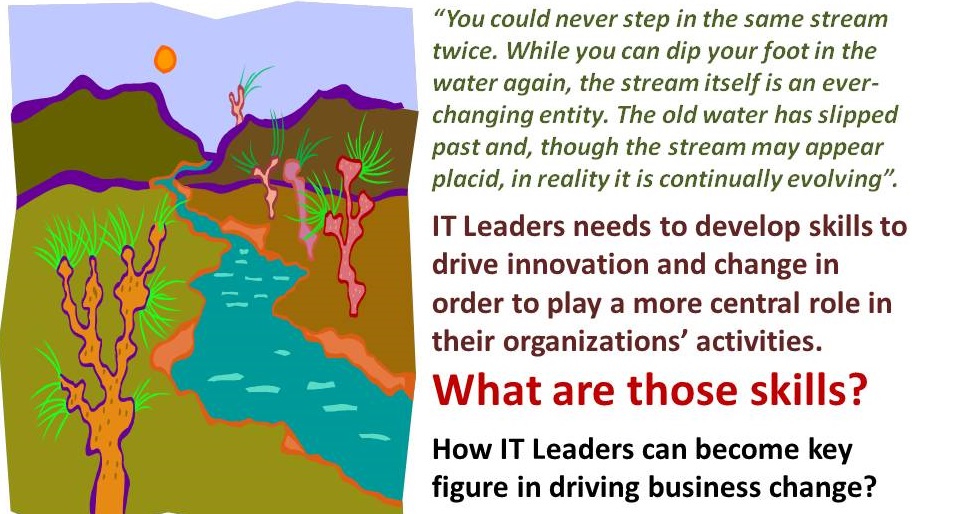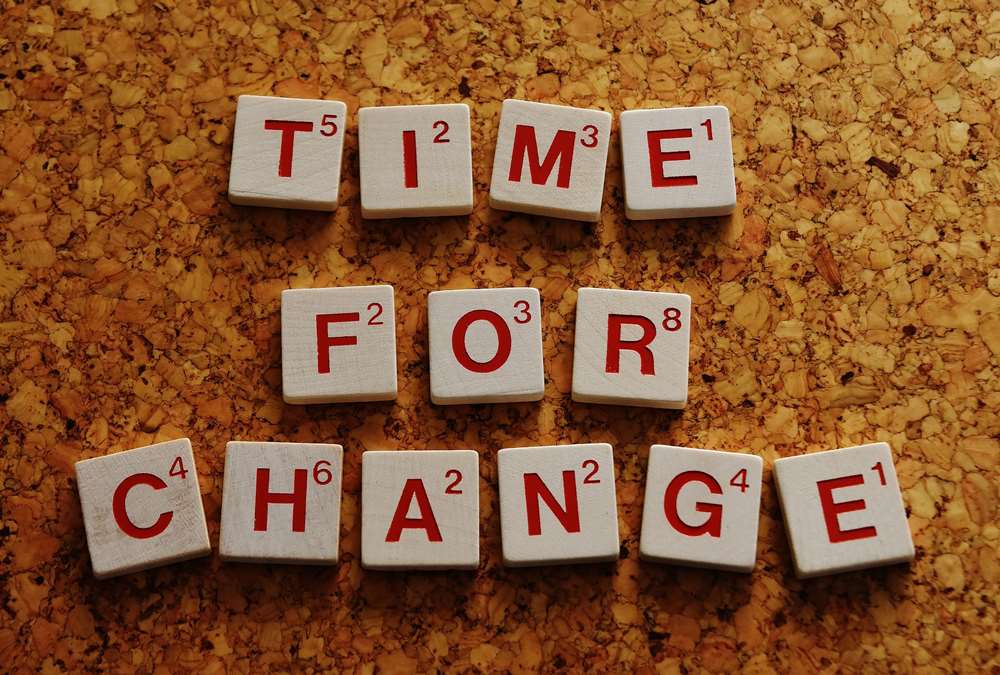- Home
- Business Processes
- Industry Knowledge
- Aerospace Industry
- Automotive Industry
- Banking Domain
- BFSI Industry
- Consumer/ FMCG Industry
- Chemicals Industry
- Engineering & Construction
- Energy Industry
- Education Domain
- Finance Domain
- Hospitality Domain
- Healthcare Industry
- Insurance Domain
- Retail Industry
- Travel and Tourism Domain
- Telecom Industry
- Leadership Skills
- eLearning
- Home
- Leadership Skills
- Change Management
- Change is the Only Constant
Change is the Only Constant
In our present Hitech scenario, society is changing very fast. What are the skills that are most relevant for leaders in relation to the changing economic environment? Leaders need to develop skills to drive innovation and change in order to play a more central role in their organizations’ activities. How do managers accept the change and meet business expectations by becoming a key figure in driving change and innovation?
Change is Happening Every Minute
The ancient Greek philosopher Heraclitus once observed that you could never step in the same stream twice. While you can dip your foot in the water again, the stream itself is an ever-changing entity. The old water has slipped past and, though the stream may appear placid, in reality, it is continually evolving. You all know that the stream changes all day, every day. You might say it changes twenty-four cross seven,” every passing second.
If you look around, you will find that ten years ago the face of the world was quite different from what we are familiar with today, and ten years from now, the world will be totally different from what it is today. The same principle is applicable to each and every being. This is because change is a natural, universal, and inevitable social phenomenon. If one wants to know at what rate society is changing, the correct answer will be at the click of the mouse. Change, since time immemorial, has affected each and every aspect of human life, whether it is a lifestyle, food habits, thought processes, language, art, relationship, religion, family, marriage, systems of society (political, economic, legal, and administrative), etc. What is important to note is whether the change is leading towards a positive end or not. Is change helping society in extension or development, or is the outcome just the reverse?
Concept of Social & Cultural Change
We need to understand that there are two types of processes that work in society - one which sustains the social system, and, the other, which brings about change in the system.
The first process may be termed, conformity, or, status quo.
The latter may be called the process of cultural and social change. In simple terms, change denotes a difference in anything observed over a period of time. Similarly, social change means observable differences in any social phenomenon over a period of time, and cultural change means observable differences in any cultural phenomenon over a period of time.
Meaning of Change
The dictionary meaning of change as a noun is making or becoming different, different from the previous state, the substitution of one for another variation, etc. Change as a verb means to undergo change, to make or become different. Change essentially implies dissatisfaction with the old and the urge for the new. Change underlies a qualitatively different way of perceiving, thinking, and behaving to improve over the past and existing practices.
The Characteristics of Change
After understanding the definition of change it is also very important to understand the nature and characteristics of change. The main characteristics of change are given below
- Change can be seen as continuous and intrinsic to an organization or as extrinsic and discontinuous.
- Change can be patterned and predictable or complex and unpredictable.
- Change is dual or bipolar.
- Continuity without change leads to stagnation, frustration, and boredom in individuals and ambiguity, conflict, and degenerative pathology in individuals and organizations.
- Many times, the rate of change is faster than our ability to comprehend and cope with it.
- Change is universal
- The speed and rate of change are relative, it differs from society to society, and from time to time.
- Social change is community change, which occurs in the life of the entire community.
- Change is a law of nature. It is natural. It can occur either in the natural course, or, as a result of planned efforts.
- One change can lead to many changes in a chain-reaction sequence.

The Meaning of Organizational Change
The term "change" refers to any alteration which occurs in the overall work environment of an organization. According to Robbins change means making things different. We are familiar with changes brought about by the twin phenomena of liberalization and globalization in all walks of life. The banking sector has adapted to the emerging scenario very fast. And the power sector is now beginning to respond to these trends. Change results from the pressure of forces, which are both inside and outside the organization.
Internal Forces
Change is continuous and intrinsic to an organization: There are changes in an organization that are minute in nature but take place continuously. An organization may be perceived as being in a state of flux (like the universe) and the elements of its systems and sub-systems always undergo subtle changes (incremental changes). Certain changes occurring inside the organization are very minute and their impact is hardly felt.
External Forces
Change as extrinsic and discontinuous: Organisations are perceived as normally stable and change is perceived as disruptive, forcing organizations to modify, restructure, or reconfigure. A few changes are cataclysmic in nature, giving the organization barely any time to cope with them. These are almost like natural calamities such as earthquakes, cyclones, etc. in their impact. Some organizations may handle changes in a creative manner or make drastic changes in their strategy and direction to emerge out of this turbulence whereas others may get lost in it.
The external forces like technology, nature of work, economic shocks, competitions, social trends, and politics necessitate a change in the internal organization. In some way or the other change influences, the whole organization as the subunits or various departments in an organization are interrelated and interdependent.
Usually, there are many changes occurring simultaneously in an organization. An effective management technique is thus required in order to deal with the changes.
Related Links
You May Also Like
-
Productivity is defined not in terms of the number of goods produced, but in terms of value-added per employee. Customers don’t really buy goods and services but in fact, they buy a value - something they value. The future is all about tangible products fulfilling intangible needs. Ideas like this can transform a business and provide them a competitive advantage to thrive in the future.
-
In its simplest sense, decision-making is the act of choosing between two or more courses of action. Decision making is a key skill in the workplace and is particularly important if you want to be an effective leader. When decisions have to be made, there are several stages that you should go through to reach a practical solution. Understand the meaning and importance of decision making and how to look at it as a process.
-
Change & Culture of Innovation
Predicting the future is a tricky business but managers need to have a future perspective in order to take business advantage and remain competitive. They need to drive and introduce constructive change to the business of the enterprise. The first step to creativity and innovation is to drive a culture of Innovation. Managers need to focus on developing future mindset all the time to keep pace with the unfolding future.
-
As we know change is inevitable as market expectations are not static, new technology is constantly being developed, and organizational responses are inevitable to these sequences. It is a simple matter of business evolution. If every manager and every employee could have some understanding of the triggers of change and their relationships with each other, then the acceptance to change would be easier.
-
Generating Ideas using Brainstorming
The brainstorming technique was developed by Alex F. Osborn in 1957 and brainstorming means where a team of members generates a large amount of alternative fruitful ideas on a specific problem without any criticism and then evaluates each idea in terms of their pros and cons. Brainstorming techniques fall into four broad categories: visioning, exploring, modifying, and experimenting.
-
Crisis leadership is a very important part of leading in today's world. The skills a leader needs in order to guide people during a crisis are different from the skills needed to help a group grow. Are you a good crisis leader? What is your leadership style in case of a business crisis situation? A business crisis can test the strongest of leaders, read this article to explore how to ensure you’re ready to take action and weather the storm when one strikes you.
-
A manager or an employee in an organization who is experiencing a high level of stress may develop high blood pressure, ulcers, irritability, difficulty in making routine decisions, loss of appetite, accident proneness, and the like. These can be subsumed under three general categories, physiological, psychological, and behavioral symptoms. Stress can give rise to a number of changes.
-
Stress is a product of the busyness of modern life. It has assumed grave dimensions ever since the emergence of industrialism. In fact, stress is a natural, ongoing, dynamic, and interactive process that takes place as people adjust to their environment. Stress can be brought about by positive or negative life events. Distress can cause disease and eustress or positive stress can promote wellbeing and increased productivity. Learn to recognize and be responsible for your stress, and learn the ways to manage stress.
-
Understanding Corporate Strategy
Management outlook and procedures have been revolutionized by more and more innovations over the recent years. It is no longer possible to follow traditional approaches to develop your organization's direction, its management as well its effectiveness. Senior managers need to be good decision-makers. In this section, we introduce concepts for strategy, strategic planning, strategic leadership, their exact meaning and associated terms, and how to use them.
-
At different points in your professional career, it is helpful to identify your core values. Values are the qualities considered to be the most important guiding principles that determine the priorities in your life and greatly influence your career choices. Your career brings happiness when it is in agreement with the beliefs you have about what is important and meaningful to you. Awareness of your values will help you develop a clearer sense of what's most important to you in life.
Explore Our Free Training Articles or
Sign Up to Start With Our eLearning Courses

About Us
Learning
© 2023 TechnoFunc, All Rights Reserved










